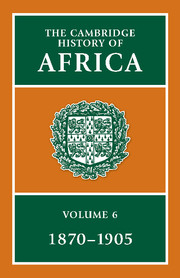Book contents
- Frontmatter
- Introduction
- 1 Africa on the Eve of Partition
- 2 The European Partition of Africa: Origins and Dynamics
- 3 North Africa
- 4 Western Africa, 1870–1886
- 5 Western Africa, 1886–1905
- 6 Western Equatorial Africa
- 7 Southern Africa, 1867–1886
- 8 Southern and Central Africa, 1886–1910
- 9 Portuguese Colonies and Madagascar
- 10 East Africa 1870–1905
- 11 The Nile Basin and the Eastern Horn, 1870–1908
- 12 The European Scramble and Conquest in African History
- Bibliographical Essays
- Bibliography
- Index
- Map 9 West Africa, c. 1870">
- Map 10 West Africa, c. 1905
- Map 13 The Congo Independent State
- Map 26 Ethiopia, the Nile Valley and the Horn in the era of Menelik II
Bibliographical Essays
Published online by Cambridge University Press: 28 March 2008
- Frontmatter
- Introduction
- 1 Africa on the Eve of Partition
- 2 The European Partition of Africa: Origins and Dynamics
- 3 North Africa
- 4 Western Africa, 1870–1886
- 5 Western Africa, 1886–1905
- 6 Western Equatorial Africa
- 7 Southern Africa, 1867–1886
- 8 Southern and Central Africa, 1886–1910
- 9 Portuguese Colonies and Madagascar
- 10 East Africa 1870–1905
- 11 The Nile Basin and the Eastern Horn, 1870–1908
- 12 The European Scramble and Conquest in African History
- Bibliographical Essays
- Bibliography
- Index
- Map 9 West Africa, c. 1870">
- Map 10 West Africa, c. 1905
- Map 13 The Congo Independent State
- Map 26 Ethiopia, the Nile Valley and the Horn in the era of Menelik II
Summary
AFRICA ON THE EVE OF PARTITION
The bibliographical material relevant to an introductory survey is potentially far more extensive than that for any of the succeeding chapters. Indeed, a full treatment would probably include a major proportion of the complete bibliographical section of volume 5 of this History. What follows is, in contrast, a deliberately selective indication of the items most essential to an understanding of the total African scene around 1870, and those which have particularly influenced the shape and scope of chapter 1.
For the societies living around the shores of the Sahara, the notion of 'desert-side' economies comes from the works of Curtin, Baier and Lovejoy. Curtin (1975) is a study of Senegambia during the time of the slave trade, and therefore deals more with the Atlantic than the Saharan trade, but many of the ideas that emerge from this book have proved extremely useful for the study of the economic and social history of western Africa as a whole. The effects of cycles of drought and recovery on the economies of the central Sudan, and the social ramifications of these economies, appears in the study of desert-savanna trade by Paul E. Lovejoy and Stephen Baier (1975). Another important analysis of a desert-side economy appears in the earlier chapters of Baier (1980). Studies of the social impact of such an economy occur in the chapters by Baier and Lovejoy, and Roberta Ann Dunbar, in Miers and Kopytoff(i977). The theme of desert-side economies is also dealt with in D. D. Cordell (1977) and R. Roberts (1980).
Keywords
- Type
- Chapter
- Information
- The Cambridge History of Africa , pp. 767 - 823Publisher: Cambridge University PressPrint publication year: 1985



